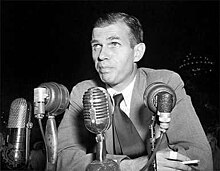Alger Hiss
| Alger Hiss | |
|---|---|

Hiss testifying in the early 1950s
|
|
| Born |
November 11, 1904 Baltimore, Maryland, U.S. |
| Died | November 15, 1996 (aged 92) New York, New York, U.S. |
| Education | Johns Hopkins University, Harvard Law School |
| Known for | Conviction for perjury related to espionage |
| Spouse(s) | Priscilla Fenster Hobson (1903–1984) (m. 1929–84), Isabel Johnson (m. 1985–96) (d.2000) |
| Children | Tony Hiss, Timothy Hobson (stepson) |
| Parent(s) | Mary Lavinia Hughes, Charles Alger Hiss |
| Relatives | Bosley Hiss, brother; Donald Hiss, brother; Anna Hiss, sister; Mary Ann Hiss, sister |
| Awards | Honorary degree from Johns Hopkins (1947) |
Alger Hiss (November 11, 1904 – November 15, 1996) was an American government official who was accused of being a Soviet spy in 1948 and convicted of perjury in connection with this charge in 1950. Before he was tried and convicted, he was involved in the establishment of the United Nations both as a U.S. State Department official and as a U.N. official. In later life he worked as a lecturer and author.
On August 3, 1948, Whittaker Chambers, a former U.S. Communist Party member, testified under subpoena before the House Un-American Activities Committee (HUAC) that Hiss had secretly been a Communist, though not a spy, while in federal service. Called before HUAC, Hiss categorically denied the charge. When Chambers repeated his claim on nationwide radio, Hiss filed a defamation lawsuit against him.
During the pretrial discovery process, Chambers produced new evidence indicating that he and Hiss had been involved in espionage, which both men had previously denied under oath to HUAC. A federal grand jury indicted Hiss on two counts of perjury; Chambers admitted to the same offense but, as a cooperating government witness, was never charged. Although Hiss's indictment stemmed from the alleged espionage, he could not be tried for that crime because the statute of limitations had expired. After a mistrial due to a hung jury, Hiss was tried a second time. In January 1950, he was found guilty on both counts of perjury and received two concurrent five-year sentences, of which he eventually served three and a half years. Hiss maintained his innocence until his death.
Arguments about the case and the validity of the verdict took center stage in broader debates about the Cold War, McCarthyism, and the extent of Soviet espionage in the United States. Since Hiss's conviction, statements by involved parties and newly exposed evidence have added to the dispute. Author Anthony Summers argued that since many relevant files continue to be unavailable, the Hiss controversy will continue to be debated. In 2001, James Barron, a staff reporter for The New York Times, identified what he called a "growing consensus that Hiss, indeed, had most likely been a Soviet agent."
...
Wikipedia
